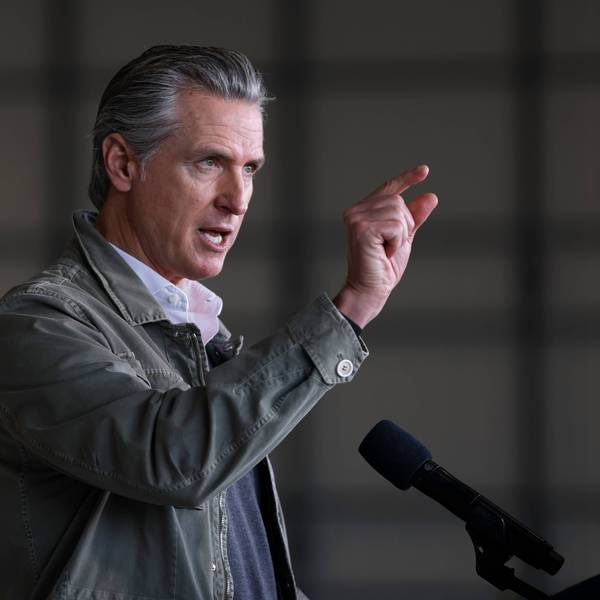Dr. Quentin Young, past president of Physicians for a National Health Program (PNHP) and from 1992-2014 the organization's national coordinator, died on March 7 in Berkeley, California where he had been under the watchful eyes and care of his daughters and other family members.
He was 92.
In addition to his work with PNHP, Dr. Young co-founded and chaired for many years the Chicago-based Health and Medicine Policy Research Group.
"Dr. Young was known for his sharp, clear-eyed analysis of social and economic problems, particularly in health care, his deep commitment to social justice and racial equality, his quick wit, his insuppressible optimism, personal courage, and his ability to inspire those around him to join him in the battle for a more equitable and caring world," said Robert Zarr, president of PNHP.
Beginning in the late 1980s, he was perhaps the nation's most eloquent and high-profile spokesperson for single-payer national health insurance, or improved Medicare for all, and was a vigorous champion of single-payer legislation, notably "The Expanded and Improved Medicare for All Act," H.R. 676.
President Barack Obama was the patient of Dr. Young's practice partner, Dr. David Scheiner, for twenty years before becoming president.
But both Dr. Young and Dr. Scheiner had a policy falling out with Obama over single payer. In 2007, Dr. Scheiner -- also a single payer advocate -- was invited -- then un-invited to a White House roundtable on health policy issues.
In Young's autobiography -- Everybody In, Nobody Out: Memoirs of a Rebel Without a Pause -- published last year, Young writes that "had I been in Congress, I would have unequivocally voted against Obamacare."
"It's a bad bill. Whether it's worse than what we have now could be argued. We rather think because of its ability to enshrine and solidify the corporate domination of the health system, it's worse than what we have now. But whether it is somewhat better or a lot worse is immaterial. The health system isn't working in this country -- fiscally, medically, socially, morally."
Young rejected the idea that President Obama should have compromised on single payer in the face of industry opposition.
"I don't have any sympathy for the idea that the president had to compromise because his opposition was strong," Young writes. "Winning is not always winning the election. Winning is making a huge fight and then taking the fight to the people -- re-electing people who are supporting your program and defeating those who aren't."
Young first met the young Barack Obama in the mid-1990s at social gatherings.
At the time, Obama was lecturing at the University of Chicago Law School and practicing law.
"We did not become bosom buddies after a few of these social gatherings -- I just viewed him as a nice, bright guy living in the neighborhood," Young says.
When Obama ran for the Illinois Senate, Young supported him.
"I was happy with his views on health care," Young writes. "He recognized that major reform was necessary and indicated support for a single-payer approach. No blushing friend, I took every opportunity to solidify his position. While not an official adviser, I tried to influence him as much as I could. My colleagues and I sent him notes touting the advantages of single-payer and the form it might take and talked with him and his staff about it whenever I had the chance."
Consumer advocate Ralph Nader said that "Dr. Young was a physician for all seasons -- for his patients, for public health facilities, for workplace safety and for full Medicare for all people with free choice of doctors and hospitals."
"He was Barack Obama's physician friend and mentor about single payer health insurance," Nader said. "Yet years later, President Obama excluded him from the roundtable discussions at the White House which he had with representatives of the insurance, drug and hospital companies. Dr. Young's compassion and wisdom will be sorely missed."
Dr. Young was an inspiration to single payer advocates around the country.
"Quentin was my mentor," said Dr. Margaret Flowers, currently a single payer candidate for the U.S. Senate in Maryland. "I admire his commitment to social justice. He set the example of what doctors should be doing -- getting out into the streets to support struggles for social justice and using our influence to fight for equal rights, including equal access to high quality health care. He started his career out as a public health officer in West Virginia."
"To me, he was a superstar. It meant so much to me that he spoke with me the night before our Baucus 8 (the eight single payer activists who were arrested in 2008 before the first Obamacare hearing before a committee chaired by then Senator Max Baucus) actions and agreed that it was time for such an action. His support gave me the courage to carry through with it."
"I had the honor of spending time with Quentin in DC, Chicago and Berkeley where he wintered with his daughter. I will always remember how he encouraged me and others to focus on 'the elegant simplicity of single payer.' I think it was Quentin who coined the phrase -- 'everybody in, nobody out.'
"Quentin was witty and brilliant and loving. He was energetic and fearless. I am privileged to have crossed paths with him. He touched so many throughout his life. He will be missed."
Dr. Young graduated from Northwestern Medical School and did his residency at Cook County Hospital in Chicago.
During the 1970s and early 1980s, he served as chairman of the Department of Internal Medicine at Cook County, where he established the Department of Occupational Medicine.
In 1983, Chicago Mayor Harold Washington appointed him president of the Chicago Board of Health, where he served with distinction. From 1952 to 2008, he was an internal medicine doctor in private practice in Chicago's Hyde Park community, where he lived most of his life.
For many years Dr. Young hosted a popular program on WBEZ, Chicago's public radio station, where he discussed health and social issues and took calls from listeners.
In 1998, he had the distinction of serving as president of the American Public Health Association and in 1997 was inducted as a Master of the American College of Physicians.
In 2009 he was appointed Health Advocate for the state of Illinois by Gov. Patrick Quinn.
In addition to his distinguished career as a physician, Dr. Young was a leader in public health policy and medical and social justice issues.
He was Dr. Martin Luther King Jr.'s personal physician during the latter's stays in Chicago, and during the civil rights era he served as national chairman of the Medical Committee for Human Rights.
"From my adolescent years to the present, I've never wavered in my belief in humanity's ability - and our collective responsibility - to bring about a more just and equitable social order. I've always believed in humanity's potential to create a more caring society," Dr. Young wrote in his autobiography.
"That viewpoint has infused my relations with family, friends, patients and medical colleagues. It's been a lifelong, driving force to promote equality and the common good, and I believe it has served me well.
"I suppose being a physician has made it easier for me to work toward this goal. Easier, that is, than if I had chosen a different occupation. I've spent a lifetime trying to help others - in my daily rounds, in my clinic, as a hospital administrator, at demonstrations, in my work with health advocacy groups - and it all adds up to deeply rewarding career. Few people have such good fortune.
"But as you've no doubt noticed in the preceding pages, my views and actions have also propelled me into sharp conflict with institutions and person who would perpetuate injustice. That was true yesterday -- it remains true today. My work is unfinished."



